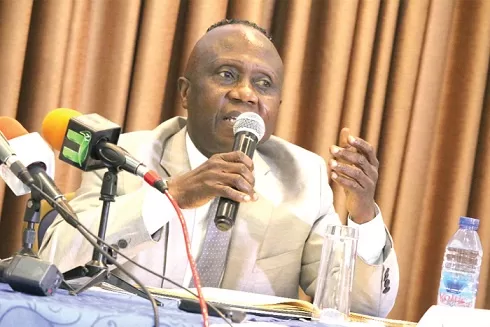Ghana’s National Economic Dialogue: A Path Beyond Debt and IMF Bailouts – Kwakye
The Director of Research at the Institute of Economic Affairs (IEA), Dr. John Kwakye, has welcomed President John Dramani Mahama’s establishment of a seven-member National Economic Dialogue (NED) Planning Committee, chaired by Dr. Ishmael Yamson.
Dr. Kwakye believes this initiative will foster a broad consensus on Ghana’s economic future, aiming to mitigate recurring financial crises and steer the nation away from over-reliance on debt and International Monetary Fund (IMF) assistance.
“The National Economic Dialogue is a crucial step initiated by President Mahama. It provides an opportunity to develop a sustainable economic framework, ensuring that Ghana can move beyond cyclical financial instability and dependence on IMF bailouts,” Dr. Kwakye stated on X.
Composition of the NED Planning Committee
The NED Planning Committee comprises distinguished experts, including Dr. K.Y. Amoako, Professor John Gatsi, Mohammed Samara, Nelly Mireku, Anthony Sarpong, and Ernest De-Graft Egyir. Their mandate was confirmed in a statement issued on January 26, 2025, by the Acting Presidential Spokesperson, Felix Kwakye Ofosu.
Objectives of the National Economic Dialogue
The government envisions three primary objectives for the NED:
- Transparency on Economic Realities: Clearly communicate the true state of Ghana’s economy to stakeholders and citizens.
- Develop a Homegrown Fiscal Strategy: Formulate a comprehensive fiscal consolidation program to guide national budgeting.
- Drive Structural Reforms: Highlight essential policy priorities needed to reset and transform the economy.
To fulfill these goals, the committee has been tasked with submitting a detailed report within four weeks, outlining key areas such as:
- Agenda Setting: Defining discussion topics in alignment with NED’s objectives.
- Expert Engagement: Inviting leading economists, energy specialists, and agricultural experts as panelists.
- Logistics Management: Overseeing venue selection, transportation, and event facilitation.
- Session Coordination: Organizing panel discussions, workshops, and interactive sessions.
- Documentation: Recording proceedings and compiling policy recommendations.
- Communication Strategy: Ensuring the dialogue reaches the public effectively.
Concerns Over Policy Continuity
However, concerns have been raised about the intent behind this dialogue. Ofoase Ayirebi lawmaker and former Minister of Information, Kojo Oppong Nkrumah, has cautioned against using the NED as a platform to justify policy reversals by the new administration.
He warned that faith in Ghana’s democracy could be undermined if the dialogue becomes an avenue for the government to backtrack on its campaign commitments.
“The youth voted with the expectation that political leaders would honor their promises. If this forum is a precursor to a policy U-turn, it will be a significant betrayal of trust. The ‘promise, win, and switch’ approach to governance must be avoided,” Nkrumah wrote on Facebook.
Echoes from Past Economic Forums
Nkrumah also pointed out that previous economic dialogues, such as the 2014 Senchi Consensus under Mahama and the 2017-2018 National Policy Summits under Akufo-Addo, produced valuable recommendations that were largely ignored. He stressed the importance of ensuring this new initiative leads to real policy implementation rather than being a mere ceremonial exercise.
“A well-structured dialogue is beneficial, but execution is key. Many of the recommendations from previous forums were neglected. The challenge remains translating dialogue outcomes into actionable policies,” he added.
He also expressed concerns about potential contradictions within the new administration, particularly regarding fiscal policies. While the Finance Minister signals job creation and expansionary fiscal measures, the President emphasizes fiscal consolidation, raising doubts about the feasibility of proposed solutions.
A Call for Effective Policy Action
The opposition, led by 2024 NPP Flagbearer Dr. Mahamudu Bawumia, has pledged constructive engagement rather than obstructionism. Dr. Bawumia assured that the opposition would closely monitor the dialogue, endorsing valuable proposals while highlighting missteps.
“We will support viable economic strategies and offer lessons from our tenure to ensure the best outcomes for Ghana’s economic future. However, we will also hold the government accountable if past mistakes are repeated,” Nkrumah asserted.
As Ghana embarks on this National Economic Dialogue, stakeholders hope it will deliver concrete solutions that foster long-term economic resilience rather than becoming another cycle of unfulfilled promises. The success of this initiative will depend on genuine commitment to implementing agreed-upon reforms, rather than allowing them to fade into bureaucratic inertia.
